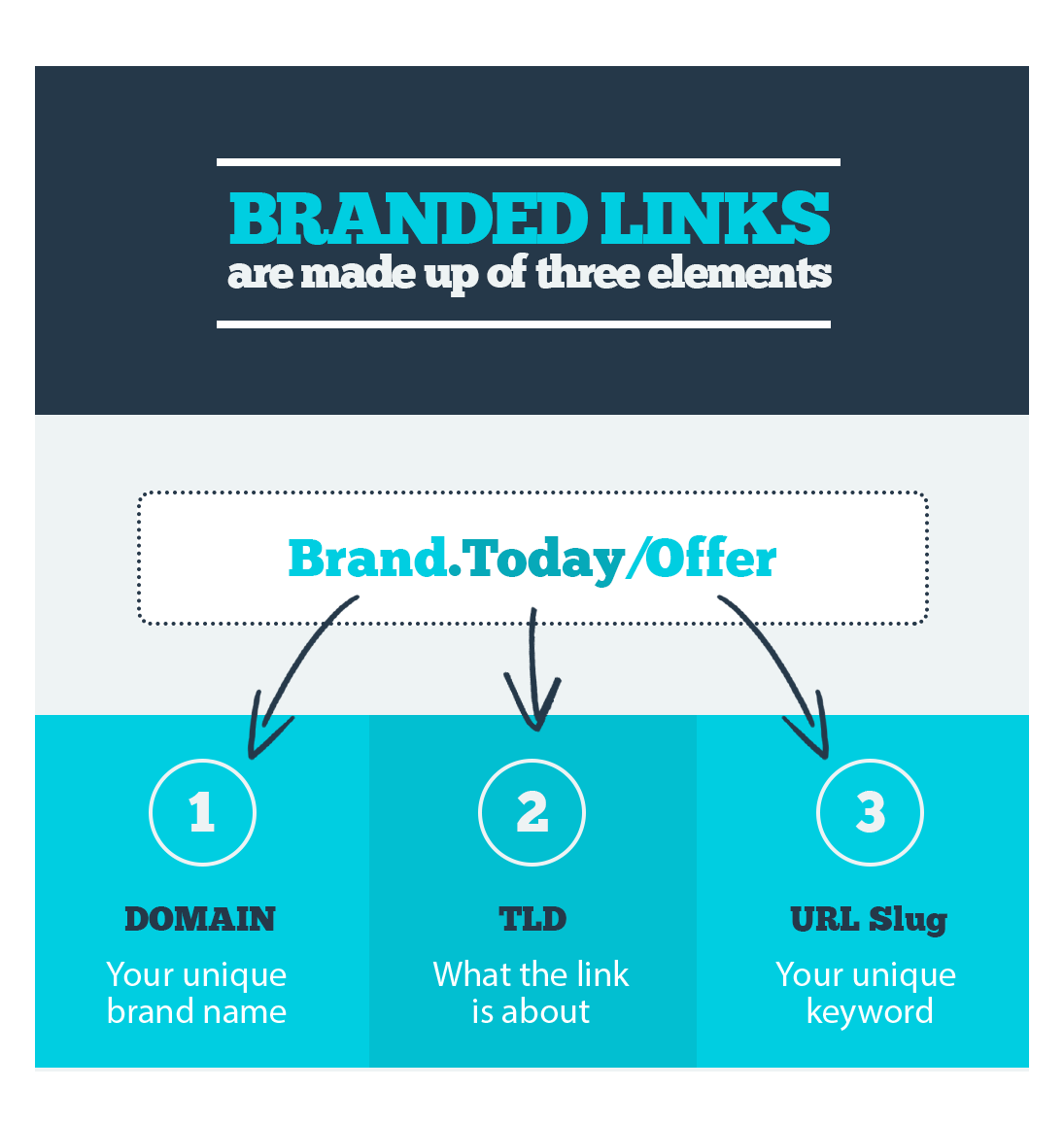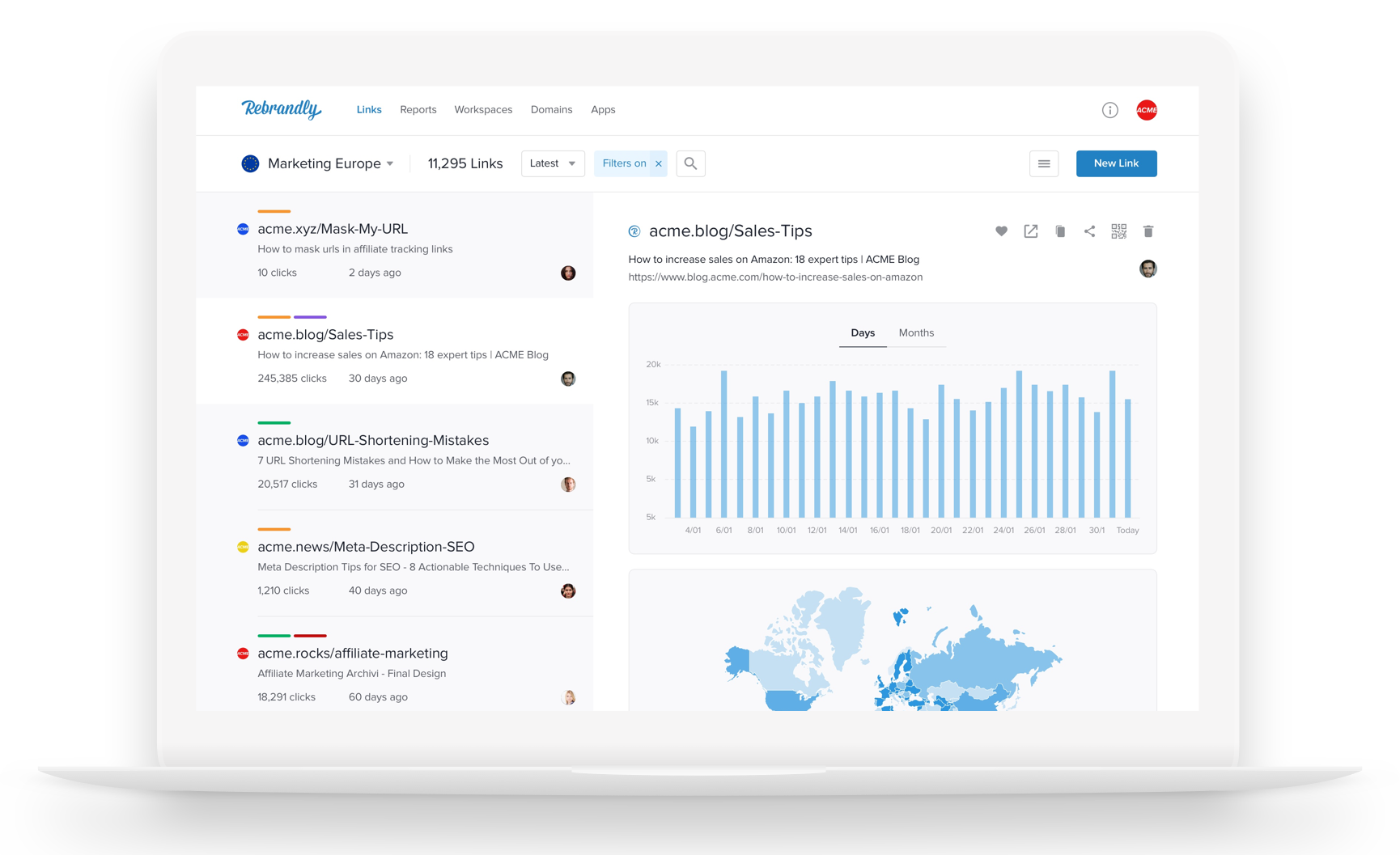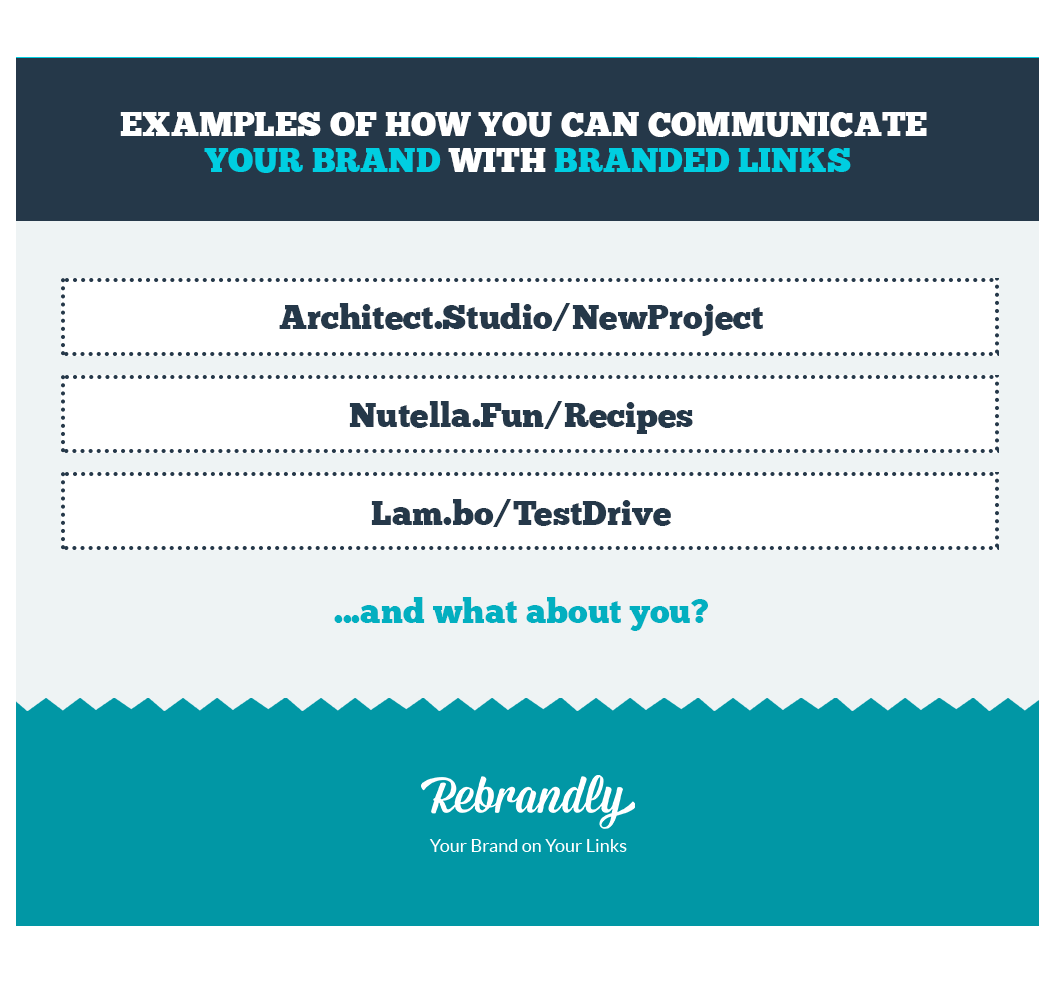What is a branded link?
While brands are the most important assets for modern companies, links are the foundation of the web. Every time someone clicks, taps, or swipes, there is a link. A link is a bridge between the message and the content, the most relevant call-to-action of online communications. When brands meet links, you get branded links—short URLs created with three elements: your brand (company name or product name), a relevant TLD (there are hundreds of new TLDs to choose from), and a unique keyword.
Branded links are the evolutionary product of traditional links and the already-popular short URLs (created using URL shorteners). They are the most effective and efficient way to share and manage links.
Why you should use branded links
A branded link is trustworthy, memorable, pronounceable, secure, and allows you to do some pretty nifty things. For instance, you can change the destination URL or route traffic based on the person who clicks it (by language or the date or time, for example).
A branded link is traceable and increases the deliverability of emails and SMS.
Rebrandly offers a short and sweet summary of the power of branded links:
Rebrandly’s been a pioneer in the world of branded links since 2005 and now helps
550,000+ companies brand their links, including huge names like Lamborghini, Indeed, Intuit, Ferrero and Puma.
If you’d like to learn more, check out their guide to link management.
How to increase domain sales with branded links
Until now, domain names were employed quite exclusively for websites/blogs, and emails.
Today there is a third use: branded links.
This is a great opportunity for your customers to improve their brand visibility and maximize the effectiveness of the links they share. As a domain reseller, it’s also a great opportunity for you to offer an innovative and useful service for free. You’ll sell more domains and provide real value.
Using Rebrandly as a reseller

With Rebrandly, you can offer branded links at no additional cost to you or your customers. Rebrandly doesn’t charge any sort of fee or commission.
All your customer has to do is to register a domain name with you (no commission to Rebrandly required). And all you have to do is integrate with Rebrandly.
Here’s how it works:
When a customer buys a new domain name for their website you can suggest purchasing a second domain (same name but different TLD) for their branded links. For example, they might buy company.com for their website and company.buzz for their social, or company.press for their PR content.
Rebrandly itself has multiple domains which they use for very specific purposes:
- Rebrandly.video for their youtube channel and to share video content
- Rebrandly.buzz for social media sharing
- Rebrandly.press to share the news with journalists and bloggers
- Rebrandly.support for support tickets and to share links to FAQs
- Rebrandly.link for general branded links
- Rebrandly.click to enhance call-to-action links
- Rebrandly.fun for sharing jokes and fun stories internally to their team
- Rebrandly.download to share downloadable big files
- Rebrandly.academy to share their knowledge base
- Rebrandly.sale to share offers to potential customers
- Rebrandly.blog to share blog articles
That’s 11 domain names only for branded links, in addition to their .COM corporate site. Many companies have similar needs, making branded links a practical upsell opportunity.
What you (and your customers) can do with Rebrandly
Rebrandly incorporates a bunch of smart features that help you get granular with your campaigns and link tracking.
Multiple domain management
You can manage up to 1000 domains in a single account, and Rebrandly will automatically activate an SSL certificate for each — even if the domain was purchased from another provider. The platform allows you to manage the 404-page redirect and the main domain redirect.
UTM and link parameter builder

Urchin Tracking Module (UTM) parameters are used by marketers to track the effectiveness of online marketing campaigns across traffic sources and publishing media. Rebrandly lets you create UTM parameters, and even more advanced parameters, in a fast and efficient way.
Puma, the well-known shoe and sportswear brand, uses Rebrandly’s parameter builder across all their marketing and affiliate teams in order to build trackable and measurable links that interact directly with their business intelligence tools.
Link routing
Dynamic link routing lets you send your audience to different destination URLs based on factors like the date, language, and user location. Lamborghini, the luxury car company, shares dynamic branded links on their social media using Rebrandly. The person who clicks on the link is redirected to specific content based on their location.
Link retargeting
Link retargeting involves inserting your retargeting pixel code – be it Facebook, Google, Twitter, or otherwise – inside of a short link so that anyone that clicks on the link is added to your retargeting pixel. With Rebrandly, you can “fire” a retargeting pixel directly within a link, whether it points to your website or not. Learn more
Deep linking
This allows brands to route traffic to a mobile application installed on a user’s phone. This advanced feature improves mobile user experience and increases conversion rates. Telecom companies like ThreeMobile use this feature especially when they send mass SMS communications.
Workspaces and roles
With Rebrandly, it’s possible to create unlimited workspaces with various role profiles and access levels for individual employees. Saint Gobain, a French multinational corporation with offices in 67 countries and over 170,000 employees worldwide, uses Rebrandly to give global departments the freedom to create custom short URLs organized by nation. Employees can share branded links for portfolios, product catalogues, documents, email signatures, and business cards. They’ve also widely adopted the solution for showcasing their various products.
Are you using generic short URLs or branded links?
Or, just as importantly, could your customers be using them to support their marketing efforts? You can start by getting creative with the TLD options you pitch to your customers, introducing them to the use cases of branded links, and, perhaps, integrating with Rebrandly to offer them a link-management solution.
